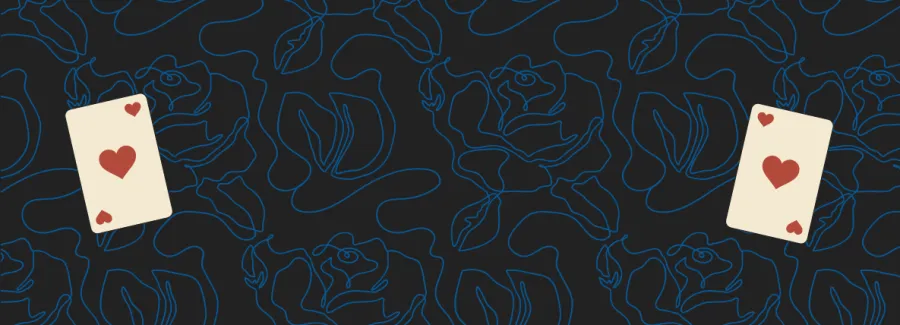If you’ve played with action players at your local casino or watched one of the old episodes of High Stakes Poker, you’ll have heard people talk about prop bets. But what exactly are prop bets? Are they worth your time, or should you ignore them and focus on the poker? We’ll answer all of that and more in this beginner’s guide to poker prop bets.
What is a Prop?
A “prop” or a “proposition bet” is a side bet made between players at the table, sometimes about what will happen during the hand, but sometimes about “extracurricular activities”. Most of the prop bets you’ll hear at the table relate to the poker, whether it’s a bounty for winning with a certain hand or players betting on what the flop, turn, or river will be.
However, poker is famously a game of egos, and when those egos clash, it can lead to some extraordinary bets made away from the felt. We’ll cover some of the more famous ones in another piece, including weight loss bets with Ted Forrest and Mike Matusow, golf bets with Erick Lindgren and Phil Ivey, and backflip bets with Huck Seed. For now, let’s learn to walk before we run and focus on the poker-related ones.
Props For the Whole Table
There are two kinds of prop bets you can make whilst playing poker – ones that involve the whole table and ones between you and a friend. The ones for the whole table require everyone’s participation to be worthwhile, as if some people refuse to join in, it puts them at an advantage over the other players. You also need permission from the card room, as some casinos won’t allow prop bets such as these to be played at the tables due to licensing concerns.
The majority of these games require the table to pay a bounty to a player who accomplishes a difficult task or require a player to pay a bounty if they fail to accomplish a task. The exact task set by the table will vary depending on the prop bet, and these bets can lead to some interesting dynamics at the table. Let’s take a look at the most popular prop bets for the whole table.
The 7-2 Game
Arguably the most well-known prop bet in poker is the 7-2 game. 72 is known as the worst hand in poker, so to make the game more interesting, you can decide to award a bounty to anyone who manages to win a hand with 72. The size of the bounty will vary depending on the game, but it’s often anywhere between 5-20bb, based on the amount of pain you want to inflict.
This game is the most popular due to its simplicity – all you have to do is win a hand with 72, and you’ll get paid by the other players if you do. It doesn’t matter if you win at showdown or with a bluff; as long as the chips are getting pushed towards you at the end of the hand, you can claim your bounty.
It also creates interesting dynamics at the table, as you don’t know if someone is value betting with a very strong hand or bluffing with 72. Even if the bounty is relatively small, players will try to win a hand with 72 just for the ability to rub it in the faces of their opponents when they manage to get a bluff through.
Some players have even expanded on this game to include hands like 83 and 94, but it’s hard to beat the classic 72 game.
The Button Game
We all know the button is the most profitable position at the poker table, and you can expect to win lots of hands playing from it, but what if you were punished for not winning a hand from the button? That’s the basis of the button game – a game where players must pay a bounty for not winning a hand on the button.
The mechanics of the button game are simple; the table agrees upon a set amount that must be paid by the player who fails to win on the button – usually between 1-5bb. That bounty then goes onto the button when it is passed to the next player. If that player wins the hand, they win the bounty, but if they fail to win the hand, they must add their own bounty to be passed to the next player, and so on.
After a couple of hands, there’s can be a significant bounty up for grabs just for winning a hand on the button.
The Standup Game
Usually, being the last one standing is a good thing – but not in the standup game. If you’re the last person standing in this game, you owe every other player at the table a bounty, which can quickly get expensive!
To play this game, everyone must agree on a bounty to be paid by the last person standing, usually somewhere between 2-10bb. When the game starts, everyone must stand up. Once you win a pot, you’re allowed to sit back down. It doesn’t matter how you win the pot; as long as the chips are pushed your way, you can sit down. However, you must win the pot outright – chopped pots don’t count. The last person standing must pay out the agreed bounty to every player at the table.
This game can create a lot of tension, especially when there are only two or three players left standing.
Props For You and a Friend
If you can’t get everyone at the table involved in your prop bets or just want to gamble with your friend, you can play some 2-3 player prop bets. These are side bets on the outcome of certain elements of the hand but do not impact the way the game is played. Let’s take a look at some of the most popular prop bets.
The Red/Black Game
While some may call it degenerate behaviour to bet on what colour the flop will be, it’s actually a lot of fun! This game is popular due to its simplicity, but you can make it as complicated as you’d like. The base game is a simple bet on whether the flop will be mostly red or mostly black. You pick a colour with your friend, who picks the opposite colour, and you agree on an amount to pay the winner. If your colour comes in, you win, but if it doesn’t, you lose – it’s that easy.
However, you can make it more complicated by adding clauses or extending the bet to the turn and river. For example, you can win double if the flop comes down all red or all black, you can win 4x if all of a particular suit comes out, you can win 8x if the flop, turn, and river all your colour – the possibilities are endless!
The Suit Game
A variation on the red/black game is the suit game. This game takes it one step further, as it’s now not enough for the right colour to come on the flop; the right suit needs to appear for you to win. The exact rules of the game can be deliberated between you and your opponent, but the most common way to play it is for a player to pick either one or two suits, and both players agree to pay the other a set amount depending on how many cards of that suit appear on the flop.
For example, if you pick hearts and I pick diamonds, I’ll agree to pay you $5 for every heart on the flop, and you’ll agree to pay me $5 for every diamond on the flop. So, for a flop of AhKdQh, I owe you $10, but you owe me $5, so you end up with a $5 profit.
You can make this game more interesting by adding bonuses for the flop having all three of a particular suit, or by doubling the stakes if the previous round was a push.
The Pick a Card/3 Cards Game
If suits and colours are too boring, you can play the Pick a Card prop game or the more commonly played 3 Cards game. In this prop bet, you and your opponent pick one or three cards to be your “props.” If your card appears on the flop, you win the bet, and if your opponent’s cards come out, you lose the bet.
This game is commonly played with three cards, as it’s a statistical likelihood that at least one of your three cards will hit the flop, which makes the game a lot more interesting and leads to more bets being won or lost. Again, just like the other prop bets, this game can be as complicated as you’d like. Those of you who watched those early seasons of High Stakes Poker/Poker After Dark will remember this game, as it’s the one that Doyle, Ivey, Negraneu, and others were playing during those games.
Some examples of the variations they added include things like doubling the amount if your card appears in the middle of the flop, getting a bonus if your suit is on the flop, and doubling the amount you win if you had a winner in the previous round.
Why Do People Play Props?
The simple answer is because people like to gamble! Many players who sit down at the poker table aren’t thinking of GTO ranges and proper postflop strategy; they’re there to have a good time and gamble their money – and prop bets are a good way to do that.
Plus, live poker can be very slow, and if you’re card dead, it’s easy to lose interest. Playing small prop bets such as these is a fun way to keep yourself engaged with what’s going on during the hand, even when you’re getting bored. However, make sure you don’t get too involved in the props and forget to play your hand properly!
Should I Play Props?
The answer to whether or not you should play props depends on what your goal is when you sit down at the poker table. If the goal is to have as much fun as possible and you find prop bets fun, then by all means, gamble it up with the rest of the table. But, if your goal is to be as profitable as possible, then it’s best to give the card-based props like the red/black game a miss.
That being said, some of the table-wide prop bets are worth participating in to gain favour with the rest of the players at the table. After all, no one wants to be the nit who wouldn’t play the 7-2 game just because they don’t want to gamble. Plus, if you’re one of the better players at the table, you should be able to adjust to the new dynamic better than your opponents, giving you a bigger edge.
Even if you’re against these games, it’s worth it to join in just so you continue to get action later on in the night – just because you’re playing the 7-2 game doesn’t mean you actually have to play 72 when you’re dealt it. You’re well within your rights to just fold it and take the goodwill from the rest of the table.
Summary
Prop bets are fun side bets that you can make while playing poker. These bets can be about the outcome of certain cards appearing on the board, or they can be bounties awarded to or taken from players based on whether or not they complete a certain task. They can add an interesting dynamic to the game, promote more action from the players, and can even increase the edge of the players who are better able to adjust to the new dynamic.





















